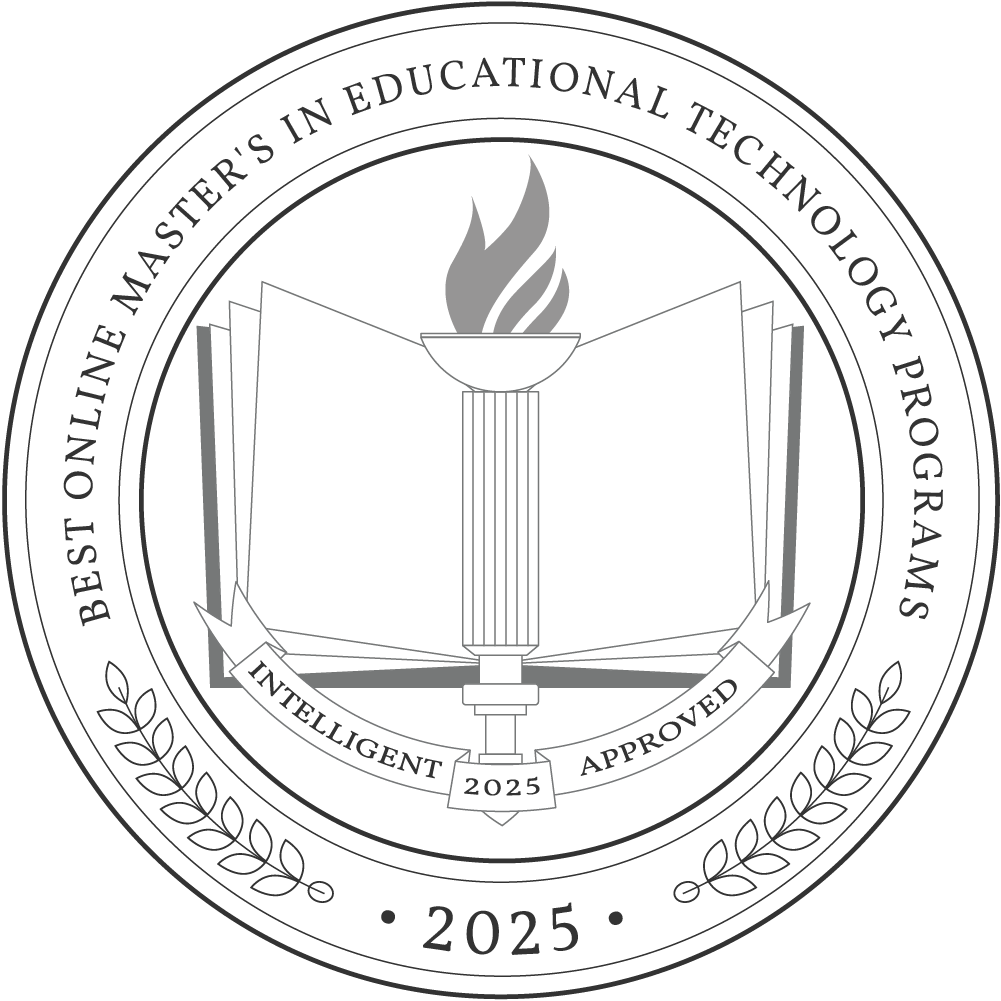A master’s in educational technology degree teaches students how to implement technology as a successful part of learning. The skills the program teaches can be applied to K-12 and higher education institutions, business, healthcare, government, and more.
For instructional coordinators, the Bureau of Labor Statistics reports a median annual salary of $74,620. Training and development managers make $125,040 per year.
The average annual tuition for a graduate degree program is $20,513. Full-time master’s in educational technology programs typically take two years to complete.
Why Trust Us
The Intelligent.com Higher Education Team is dedicated to providing students with independent, equitable school and program rankings and well-researched resources. Our expert-driven articles cover topics related to online colleges and programs, paying for school, and career outlooks. We use data from the U.S. Department of Education’s College Scorecard, the National Center for Education Statistics, and other reputable educational and professional organizations. Our academic advisory team reviews content and verifies accuracy throughout the year for the most current information. Partnerships do not influence rankings or editorial decisions.
- Analyzed over 2,000 national, accredited, and nonprofit colleges and universities
- 800+ rankings pages are reviewed and updated yearly
- Content is informed by reputable sources, surveys, and interviews with academic advisors and other experts
- Over 100 data points are reviewed for accuracy and quality throughout the year, including sources
How we rank schools
Our list features the best online Educational Technology degree programs at top colleges nationwide. Each school featured is a nonprofit, accredited institution — either public or private — with a high standard of academic quality for post-secondary institutions.
We evaluated each school’s program on tuition costs, admission, retention and graduation rates, faculty, reputation, and the student resources provided for online students. We collected data from trusted sources like the National Center for Education Statistics, individual school and program websites, school admissions counselors, and other data sources. Then, we calculated the Intelligent Score on a scale of 0 to 100 based on the following criterion:
Academic Quality:
- Admission rate versus enrollment rate
- Retention rate of students who return after year one
- Accreditation status (regional and programmatic)
- Nonprofit status, both private and public institutions
Graduation Rate
- Overall graduation rate
- Total number of currently enrolled students, including diversity metrics
- Student-to-faculty ratio
Cost and ROI
- In-state and out-of-state per-credit tuition rates and fees
- Required credits to graduate
- Earning potential after graduation
- Availability of federal student loans, scholarships, and other financial aid options
Student Resources
- Available student services for online-only and hybrid programs
- On-campus amenities like tutoring centers and the number of libraries
Read more about our ranking methodology.
Best 48 Online Master’s in Educational Technology Programs
FiltersInstitution Type
Status
- Intelligent Score
- Alphabetically By University Name
- Acceptance Rate
- Enrollment
- In-state Graduate Tuition
- Out-of-state Graduate Tuition
- In-state Undergraduate Tuition
- Out-of-state Undergraduate Tuition

North Carolina State University
Intelligent Score: 99.49In-state: $6,535
Out-of-state: $26,654
In-state: $9,095
Out-of-state: $9,095
SAT: 1230-1410
ACT: 27-32
Resident: $547
Non-Resident: $1,701
Online
Southern Association of Colleges and Schools Commission on Colleges
30-36

University of Florida
Intelligent Score: 99.38In-state: $4,477
Out-of-state: $25,694
In-state: $10,770
Out-of-state: $10,770
SAT: 1290-1460
ACT: 29-33
$449
Online
Southern Association of Colleges and Schools Commission on Colleges
33

University of Georgia
Intelligent Score: 98.92In-state: $9,790
Out-of-state: $28,830
In-state: $8,878
Out-of-state: $8,878
SAT: 1250-1460
ACT: 29-33
$645
Online
Southern Association of Colleges and Schools Commission on Colleges
36

University of Central Florida
Intelligent Score: 97.89In-state: $4,478
Out-of-state: $19,810
In-state: $6,916
Out-of-state: $6,916
SAT: 1160-1340
ACT: 25-30
In-State: $327
Out-of-State: $1,152
Online
Southern Association of Colleges and Schools Commission on Colleges
36

Florida State University
Intelligent Score: 97.54In-state: $4,640
Out-of-state: $19,084
In-state: $9,684
Out-of-state: $9,684
SAT: 1220-1350
ACT: 27-31
In-State: $444
Out-of-State: $1,076
Online
Southern Association of Colleges and Schools Commission on Colleges
36

Texas A&M University College of Education and Human Development
Intelligent Score: 97.49In-state: $8,395
Out-of-state: $36,849
In-state: $6,775
Out-of-state: $6,775
SAT: 1160-1380
ACT: 26-32
Resident: $788
Non-Resident: $1,319
Online
Southern Association of Colleges and Schools Commission on Colleges
36

Johns Hopkins University
Intelligent Score: 97.16In-state: $54,160
Out-of-state: $54,160
In-state: $57,010
Out-of-state: $57,010
SAT: 1470-1560
ACT: 34-36
$1,086
Online
Middle States Commission on Higher Education
36

University of Illinois at Urbana - Champaign
Intelligent Score: 96.76In-state: $14,317
Out-of-state: $33,824
In-state: $15,016
Out-of-state: $15,016
SAT: 1200-1460
ACT: 27-33
$520
Online
Higher Learning Commission
32

Liberty University
Intelligent Score: 96.69In-state: $14,791
Out-of-state: $14,791
In-state: $7,935
Out-of-state: $7,935
SAT: 1040-1250
ACT: 21-29
$415
Online
Southern Association of Colleges and Schools Commission on Colleges
36

University of South Florida
Intelligent Score: 95.96In-state: $4,559
Out-of-state: $15,473
In-state: $8,350
Out-of-state: $8,350
SAT: 1160-1320
ACT: 25-30
$348
Online, On-Campus
Southern Association of Colleges and Schools Commission on Colleges
33

CSP Global
Intelligent Score: 94.01In-state: $32,660
Out-of-state: $32,660
In-state: $9,090
Out-of-state: $9,090
SAT: 990-1180
ACT: 19-25
$395
Online
Higher Learning Commission
30

Western Governors University
Intelligent Score: 93.43In-state: $6,380
Out-of-state: $6,380
In-state: $7,500
Out-of-state: $7,500
SAT: N/A
ACT: N/A
$418 - $497
Online
Northwest Commission on Colleges and Universities
32-38

University of West Alabama
Intelligent Score: 93.16In-state: $9,100
Out-of-state: $18,200
In-state: $6,678
Out-of-state: $6,678
SAT: N/A
ACT: 17-22
$429
Online
Southern Association of Colleges and Schools Commission on Colleges
30

Michigan State University
Intelligent Score: 92.95In-state: $15,555
Out-of-state: $40,384
In-state: $18,858
Out-of-state: $18,858
SAT: 1100-1300
ACT: 23-29
$933
Online
Higher Learning Commission
30

Concordia University Irvine
Intelligent Score: 92.8In-state: $32,660
Out-of-state: $32,660
In-state: $9,090
Out-of-state: $9,090
SAT: 990-1180
ACT: 19-25
$685
Online
Western Association of Schools and Colleges Senior College and University Commission
30

Concordia University Chicago
Intelligent Score: 90.4In-state: $32,660
Out-of-state: $32,660
In-state: $9,090
Out-of-state: $9,090
SAT: 990-1180
ACT: 19-25
$505
Online, Hybrid
Higher Learning Commission
30

William Woods University
Intelligent Score: 90.27In-state: $25,000
Out-of-state: $25,000
In-state: $6,750
Out-of-state: $6,750
SAT: N/A
ACT: N/A
$475
Online
Higher Learning Commission
30

Fort Hays State University
Intelligent Score: 90.07In-state: $4,140
Out-of-state: $14,580
In-state: $3,726
Out-of-state: $3,726
SAT: N/A
ACT: N/A
$339
Online
Higher Learning Commission
36
How to Choose an Online Master’s in Educational Technology Program
Choose your area of study
This degree may be available as a Master of Education (MEd), Master of Science (MS), or Master of Arts (MA). Furthermore, many programs will allow you to select a concentration and focus your studies on a particular niche in this field, such as training and development or school library media. If you already know what you would like to do after you graduate, look for programs that closely match these career goals.
Research schools and programs
You should only apply to institutions that have been approved by a DOE-recognized regional accrediting organization, such as the New England Commission of Higher Education or Northwest Commission on Colleges and Universities. These organizations evaluate schools to ensure they provide students with a high-quality education. Those who attend a school that isn’t regionally accredited may be unable to access financial aid or transfer credits to another institution if needed.
Those interested in a teaching career should look for options approved by the Council for the Accreditation of Educational Programs (CAEP). This accrediting organization has particularly high standards for teaching-related programs.
Students should also research what schools offer regarding curriculum, faculty support and access, instructor credentials, graduation and job placement rates, and support services for online students.
Other questions to investigate include:
- Do students need a background or bachelor’s degree in education to be eligible for admission?
- Is field experience or an internship necessary?
- Do online students have access to tutoring services?
To learn more about any schools that you’re interested in, you can visit the school’s website, contact an admissions counselor, follow the school on social media, or attend an in-person or virtual open house.
Prepare for tests and applications
Admissions requirements vary by program, but some common standards include a background in education and teacher certification as well as a minimum undergraduate GPA (typically a 3.0).
Begin gathering required application materials, which usually include the following:
- Official transcripts from all schools previously attended
- Letters of recommendation from colleagues, community leaders, or former professors
- A personal essay or statement that outlines your academic and professional background, reasons for seeking graduate education, and career aspirations
- A resume highlighting relevant experience
- GRE scores
To keep track of these materials and when they are due, a spreadsheet or checklist can be helpful. Always contact an admissions counselor to ensure you have the most accurate information regarding requirements and deadlines.
Select your program
As you gather information, eliminate any schools that won’t meet your needs in terms of curriculum or cost. This will help you choose the schools you’ll actually apply to. There’s no right or wrong number of schools to apply to; some students only apply to one program, while others submit multiple applications to increase their odds of acceptance. However, if you’re applying to a high number of programs, remember that most schools charge application fees, which can quickly add up.
Before making your final decision, review your needs and goals again. Do you plan to attend school full-time or part-time? Do you want your program to be as online as possible, or are you fine with a hybrid program that has a fair amount of in-person requirements? Some programs offer asynchronous courses, which can be completed at your own pace, while others only offer synchronous courses, which involve remotely attending lectures and completing assignments at the same time as other students — which of these two online learning formats do you prefer? Your school should accommodate your scheduling needs and learning preferences.
Determine how you’ll pay for your degree
Fill out the Free Application for Federal Student Aid (FAFSA) to determine eligibility for need-based aid such as federal student loans, grants, fellowships, assistantships, scholarships, and work-study opportunities. Students with exceptional academic achievement or extracurricular activities can seek merit-based scholarships and grants from the institution or external organizations like professional development groups, non-profits, and community organizations.
If you plan to work while attending school, find out if your employer offers tuition assistance benefits. Veterans and military service members should inquire about tuition discounts and GI Bill benefits. And everyone should speak to financial aid counselors at the schools they’re interested in for the most accurate and specific information about program cost.
What Can You Expect from an Online Master’s in Educational Technology Program?
An online master’s in educational technology program will cover subjects such as:
- Online learning
- Adult education
- K-12 education
- Training and performance improvement
- Research technology and theory
- Information and communication technology
- Computer-based instruction
This degree typically involves 30 to 36 credit hours of coursework. A thesis, practicum, field experience, or professional portfolio requirement is common with most graduate education degrees.
Educational technology students might have to pay a fee for access to a technology resource center. Educators desiring to work in public schools may need to pay for state certification exams. An educational technologist working in the business field doesn’t need teaching certification, but they can gain on-site experience with internships.
Potential courses you’ll take in an online master’s in educational technology degree program
- Assistive Technology for Individualized Education Plans. This class discusses how technology aids learners with special needs. The focus is on how assistive technology removes barriers for students with impairments.
- Emerging Technologies. Educational technology outside the public domain is covered in this class.
- Artificial Intelligence in the Classroom. Students learn how to implement artificial intelligence in lesson plans. Critical thinking using artificial intelligence is encouraged.
- Practical Teaching for Technology. This class focuses on how to balance technology instruction techniques with traditional methods. The pros and cons of technology in the classroom are a central theme.
What Can You Do With an Online Master’s in Educational Technology Degree?
Career outlook
A degree in educational technology allows you to pursue a variety of career paths across different industries. These include primary, secondary, and postsecondary education as well as corporate training and development, healthcare, and business administration. Any industry that uses technology in its training and continuing education for employees can benefit from someone with these skills.
Because educational technology is applicable to so many industries, the job titles graduates may see can vary significantly. Here are some common career paths for those with a master’s in educational technology:
- Instructional coordinator — Develop, implement, and assess the effectiveness of educational materials.
- Median annual salary: $74,620
- Projected employment growth (through 2032): 2%
- New job openings projected: 19,200 annually
- Training and development manager — Design and manage an organization’s employee training programs.
- Median annual salary: $125,040
- Projected employment growth (through 2032): 6%
- New job openings projected: 3,500 annually
- Elementary, middle, or high school principal — Oversee school staff and operations at the K-12 level.
- Median annual salary: $103,460
- Projected employment growth (through 2032): 1%
- New job openings projected: 20,200 annually
Online Master’s in Educational Technology Degree Frequently Asked Questions
How do I apply to an online master’s in educational technology degree program?
Before starting an application to an online master’s in educational technology program, confirm all application requirements and deadlines with the school’s admissions office. They can also advise students on how to submit their application and supplemental materials. It’s common for schools to accept applications and supporting materials online, although some schools may require hard copies of transcripts.
If you’re applying to multiple schools, stay organized with a spreadsheet or checklist. This will help ensure you submit all required application materials by the deadline.
How much does an online master’s in educational technology degree cost?
The cost of a degree varies by school, so for the most accurate information, students should speak directly with a financial aid counselor at the specific school they’re planning on attending.
On average, the annual tuition for a graduate degree program is $20,513. In-state students at a public university can expect to pay less than out-of-state students or those who attend private institutions. In addition to tuition, most schools charge fees for instructional technology, student support services, and academic resources.
How long does it take to earn an online master’s in educational technology degree?
The number of credits required by individual programs, experiential learning expectations, and a student’s pace determine the amount of time it takes to earn a master’s in educational technology degree. Normally, students need about two years to complete the program. Much depends on an individual student’s rate of progress. Completion is possible in 18 months by taking 12 to 15 credits each semester. Some schools offer an accelerated program that requires more credits each session.
Is an online master's in educational technology degree worth it?
A master’s degree in education technology can help students advance in their chosen careers and open doors in other industries. This degree also prepares students to continue their education to the PhD level if they choose.
An online master’s degree in education technology allows students to get a full graduate degree experience while still being able to work around other responsibilities, such as full-time jobs and families. Internships and research opportunities are readily available, and the online format still lets you build connections with faculty and other students.
This degree option also offers hands-on experience with digital learning environments and tools, giving you an advantage when designing these same elements for others.

